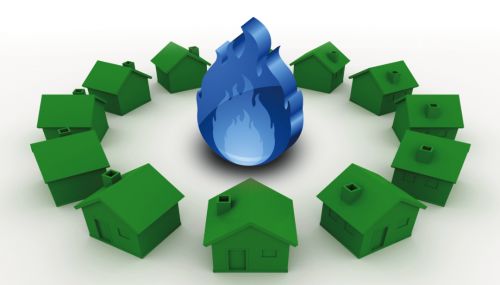All
Evolving for Survival and Success

Upon his retirement, NYOHA’s John Maniscalco discusses low-sulfur fuel, biodiesel, activism and public policy
New York City has been a bright spot for the heating oil industry during an era marked by one daunting challenge after another. While policymakers in several key states have turned their backs on fuel providers and targeted heating oil for elimination, New York City has taken a more prudent course. When former Mayor Michael Bloomberg and the New York City Council developed an emissions reduction agenda in recent years, they brought the New York Oil Heating Association (NYOHA) into the tent as a partner.
NYOHA responded by developing a proactive strategy to accelerate the use of the cleanest available fuel: a blend of ultra low sulfur heating oil and biodiesel. The plan worked, and when the City developed its first emissions reduction legislation, the heating oil industry was part of the solution. The state mandated a switch to ultra low sulfur fuel, and the City enacted the nation’s first Bioheat® fuel mandate, requiring all heating oil to contain at least 2 percent biodiesel. Buildings in New York City now use the cleanest heating oil in the country, and city vehicles are also using Biodiesel blends.
On the heels of those earlier successes, the New York City Council is now developing a more aggressive set of emissions targets, and NYOHA is once again in the thick of the action, with the City Council considering a mandate for 5 percent biodiesel in all heating oil.
By mandating the use of biodiesel blends, New York City has helped biodiesel producers and marketers gain an essential foothold in heating oil country that sets the stage for successful biodiesel blending throughout the Northeast.
In the middle of the fray has been John Maniscalco, CEO of the New York Oil Heating Association. He has worked with the association’s Board of Directors and a host of government officials and industry colleagues to formulate a new vision for heating oil that would reduce harmful emissions and maintain heating oil’s position as an essential fuel.
After nearly 24 years as NYOHA’s chief executive, Maniscalco is retiring this spring. Oil & Energy caught up with him recently to discuss the intersection of heating oil and pro-environment public policy.
Oil & Energy: What sort of future do you foresee for heating oil in New York City, provided the industry continues to embrace cleaner fuels?
John Maniscalco: By embracing and continuing to embrace cleaner fuels I envision a very bright future! Mayors and Governors are under the gun to reduce particulate matter, thereby “saving lives.” In doing so some legislative leaders elect to meet the criteria put forward by a United Nations’ initiative entitled “80 by 50,” meaning cities and/or states should strive to reduce negative air emissions 80 percent by 2050. NYC’s Mayor is a supporter of “80 by 50,” so it’s imperative that NYC’s oil industry have a seat at the table and be part of the solution, not part of the problem. As they say, “If you’re not at the table you may very well be on the menu!”
O&E: What steps can heating oil associations and dealers take to persuade policymakers to see cleaner blends of heating oil as an important part of the energy mix?
JM: First off, be aggressive! Oilheat associations and their member companies must be “as persuasive” as the natural gas industry when it comes to clean air dominance, so as to combat “their vision” that gas heat is the fuel of choice. Policymakers, or more often their staffers, often react to the last voice they’ve heard. So if they do not hear from oil heat… gas heat wins! It gets back to the process of continually educating local officials and their staff by visiting with them and providing them with properly footnoted documentation. One must also recognize that oil heat association executives are perceived to be lobbyists, or hired guns. Nothing works better than meeting with an elected official and having with you an oil dealer who has his or her office in the elected official’s district. Besides getting into the positive attributes of oil heat, having a dealer in the room speaks to providing local jobs, supporting one’s community, and VOTES! Remember, the natural gas industry is capital intensive, whereas the oil heat industry is labor intensive, meaning we provide much needed local jobs to place food on the table.
O&E: Policymakers everywhere seem to enthralled with natural gas and opposed to heating oil. What are they missing that makes accounts for that prejudice?
JM: They’re missing what we don’t tell them! Until recently natural gas dominated the air emission and pricing issues. The cost of oil heat is declining, and with ultra-low sulfur heating oil blended with biodiesel our product becomes cleaner and greener. When I speak with policymakers—or members of the press, radio or TV for that matter—until recently I could not defend our price vs. their price. So I didn’t! I mentioned how fickle the energy market is and what goes up must come down, and then I move the conversation over to the oil industry’s advancement to clean energy by the introduction of Bioheat® fuels.
O&E: What changes can the industry make in the years ahead to gain more traction with consumers in NYC and beyond?
JM: Consumers in general are very sensitive to energy economics. Yes, we all want to be “green,” and it’s politically correct to be green—until it costs some of your hard-earned green to be green! We need continued price relief. In the interim we need to focus on and educate the oil heat consuming public on our strong points: specifically our embracement of cleaner fuel, our service dynamics, our small, family-owned, fabric-of-America story, and progressive companies will look to “own the home.” By that I mean in addition to providing heating oil and burner-related services, they’ll provide air conditioning services, full-house plumbing, security alarm systems, emergency electric generator installations, they’ll sell their oil heat customers natural gas and/or electricity. To me the newest, most innovative concept is that of in-home warranties. By that I mean underwriter-insured protection of your oil heat customer’s key internal mechanical systems and major household appliances.
O&E: The biodiesel industry has carved out a footprint in the metro area thanks to the City’s Bioheat mandate. What sort of future do you foresee for Bioheat in New York and beyond?
JM: As we speak NYOHA is engaged in conversations with NYC Councilman Costa Constantinides in relation to a bill that would increase NYC’s biodiesel mandate from its current 2 percent to 5 percent. NYOHA member companies have been delivering Bioheat® fuel for three heating seasons, and the transition has been seamless at the wholesale, retail and consumer levels. So the next likely step would be to increase the blend level, which also plays into the Mayor’s above mentioned “80 by 50” initiative that makes NYC’s oil heat industry “part of the solution.” Assuming the legacy pump issue becomes rectified I can see the industry eventually advancing to a 20 percent blend.
O&E: Do you expect to see a day when ultra-low sulfur, bioblended heating oil is the accepted standard wherever heating oil is sold?
JM: I’m rather taken aback that so many oil heat regions have not already embraced the ULSHO/biodiesel package as the evolution of yesterday’s oil heat to today’s clean and green oil heat. Many states have embraced low sulfur heating oil, which will serve as a bridge to ultra-low-sulfur in the coming years, but the longer we wait the more “conversion time” we’re affording our alternate fuel competitors.
O&E: What are some of NYOHA’s legislative accomplishments that members can take pride in?
JM: I’ve been blessed with a Board of Directors having the wisdom and guidance to view NYC’s oil heating industry prospectively. I mean let’s face it: Change in most instances reflects pain, but the pain of inaction is far greater.
The most inspiring accomplishment by NYOHA’s Board was directing me to pursue ultra-low sulfur heating oil (ULSHO) whereby we would reduce the City’s sulfur content from 2,000ppm to 15ppm, literally stripping all the sulfur out of the product. My marching orders, in no uncertain terms, were to lobby my sister associations and if they expressed little or no interest I was to pursue the use of ULSHO via the NYC Council and Mayor’s office as a stand-alone NYC-only initiative. Fast-forwarding to July 2012, the entire State of New York uses ULSHO, and the overall results have been outstanding.
Another groundbreaking accomplishment would be NYOHA’s active participation since Day One in the forming of the National Oilheat Research Alliance. The process started in 1995 and culminated in success on November 9, 2000 when the NORA Act was signed into law by then President Clinton, reauthorized on August 8, 2005 by then President Bush, and most recently on February 7, 2014 by President Obama.
One additional NYOHA legislative accomplishment that must be mentioned is the City’s requirement that all heating oil sold within the City’s limits must include a 2 percent biodiesel blend, commonly referred to as Bioheat® fuel. A conversation that started in 2007 with a friendly NYC Councilman ended on August 16, 2010 with a bill that passed the City Council by a vote of 46 ayes and 0 nays. This bill, combined with the City’s use of ULSHO, affords me the “20 second bite” alluding to the fact that “NYC uses the cleanest heating oil in the nation.”
O&E: NYOHA has had some success with NYC policymakers as they pursued emissions reductions goals. What have you learned during this process that might benefit your colleagues in other jurisdictions?
JM: I believed, along with many of my colleagues, that there’s no such thing as “good legislation.” If a legislative body wants to enact legislation against one’s industry, “it can’t be good!” It took me a while, but I’ve come to the conclusion that it’s all about the bill’s drafting process, so one must be seated at the table from the bill’s onset to correct the bill’s (often un-intentioned) inaccuracies, and move forward for the betterment of all concerned parties. It’s either that or be presented with an extremely negatively worded bill that must be stopped in its tracks, which is by far a tougher task to accomplish without having a pre-advanced dialogue. I prefer to not so much defy, but after weighing all the facts try to negotiate and come to a mutually agreeable solution.
O&E: What steps can an industry association like NYOHA take proactively to improve relations in general with local legislators and government officials?
JM: NYC alone has 48 Council Members and a Mayor’s Office to contend with, not to mention the State’s Senate, Assembly and Governor’s office, compounded by our illustrious federally elected officials. My immediate political action committee “$upport” is for those elected officials who Chair committees having jurisdiction over issues affiliated with my industry, i.e. Codes, Consumer Protection, Environmental Conservation, Finance, Labor, Transportation, etc. Through these affiliations I’m often granted the access to be heard when an initiative surfaces that may appear to be detrimental to my industry. An important aspect of the access is the opportunity to inform and educate, so it’s not only your direct competition’s voice that is heard. My fear is that if it’s your competition’s voice that is the only voice heard, then their words become gospel!
O&E: What are some of the important challenges facing the heating oil industry in the next few years?
JM: The three top challenges the industry must overcome would be the price of oil … the price of oil … and the price of oil!
In all seriousness, economics is the driving force when one has a choice in picking his or her energy source. Great organizations like NEFI and PMAA are fighting the good fight, but Washington politics are politics unto themselves. And let’s face it: The alternate energy guys have a presence and a very strong lobby. That’s why it’s imperative that we support NEFI’s and/or PMAA’s legislative effort with our PAC contributions and by each and every one of us getting actively involved. By getting “actively involved,” I mean attending legislative meetings or simply picking up the phone and placing a call to your local legislator when called upon to do so.
If we embrace ULSHO and biodiesel we’ll be at par or cleaner than natural gas from a science perspective, but when certain optic incidents occur, watch out! By optic I mean even though the natural gas pipeline system leaks and pollutes the air, it goes unnoticed because those leaks are not readily visible to the human eye. Oil, on the other hand, when leaked or spilled becomes an immediate “visual pollutant” for the entire world to see! I’m not sure how we can fix that, but when an oil spill occurs whether it be BP catastrophic or otherwise, we suffer a tremendous setback in the “as clean” argument.
Lastly, we must all learn to work together to accomplish what’s best for the betterment of the industry. If there is one thing I have learned over my 24-plus years at NYOHA it is the lesson that a unified and coordinated effort greatly increases the chances of success in our industry’s struggle to survive. There are still companies, for reasons best known to themselves, who prefer to function outside the association’s tent. But fortunately this small group of naysayers has not been able to deter the cooperation, genuine good will, understanding and camaraderie of this great industry’s associations and core member companies. To those non-believers I say “You’re welcome” for all that associations and those member companies have done and will continue to do by acting unilaterally and unselfishly with the best interest of the industry at heart. We need to get those naysayers inside the tent.
O&E: What lessons did your association and members learn from the struggles that followed Superstorm Sandy in 2012?
JM: I first started in the retail business in 1970, ending that portion of my career and taking over NYOHA in 1991, so I’ve seen my fair share of industry-related catastrophes, embargoes and all. But I have never experienced the wrath of mother nature that we saw when she sent in Superstorm Sandy. The degree of immediate destruction was unconceivable!
The effects of Superstorm Sandy caught everyone off guard, so on October 17, 2014 Columbia University’s Center on Global Energy Policy hosted a roundtable discussion on how to fortify the Tri-State Region’s liquid fuel supply chain following Superstorm Sandy. The roundtable brought together top federal, New York State, New Jersey and New York City energy and resilience officials with high-level representatives from the energy industry, including electric utilities, refineries, terminals, pipelines and retail outlets. The discussions focused on priority topics to increase the resilience of the regional fuel supply, and sought to identify and recommend next steps to enhance regional coordination on these issues. Those topics were: (1) maximizing situational awareness and information flow during disruptive events, (2) new regional government refined petroleum product reserves, (3) adequate resilience for critical assets, and (4) improving the emergency fuel waiver process and coordination. One primary goal of the roundtable was to identify specific items and/or issues generally considered to warrant priority attention from industry and government going forward. The main lesson learned, from a heating oil perspective, is to be prepared in relation to the securing of waivers. During the storm we invoked 22 crucial-to-the-mission federal, state and local waivers.
O&E: On a personal note, what do you have planned for retirement activities?
JM: My wife of 43 years “claims she still like me,” so we’re going to get reacquainted by travelling abroad while we still physically can, and when not abroad enjoy our four children and grandchild. With two of our four children living out-of-state that only adds to our traveling agenda. I have a list of volunteer organizations I’d like to get back into, Rotary International being one of them. Life’s been good to me; I’ve done well, so it’s time for me to do some good, meaning it’s time for me to re-visit my old altruistic self and put some community service before self. In the not too distant future I can see a relocation to another state, but then again, who knows!
Related Posts
 The Possibilities of Renewable Propane
The Possibilities of Renewable Propane
Posted on March 13, 2024
 Propane Can Do That
Propane Can Do That
Posted on March 12, 2024
 Take Action and Take Control of Your Future at Industry Summit VI and Visions ‘24
Take Action and Take Control of Your Future at Industry Summit VI and Visions ‘24
Posted on March 11, 2024
Enter your email to receive important news and article updates.

